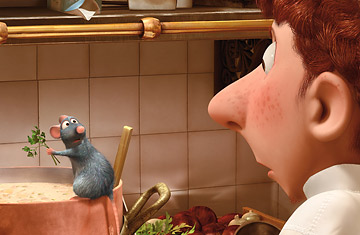
Ratatouille
(4 of 5)
ANIMASIAN
Don't ask Satoshi Kon when he's going to get a real job. "I'm an anime director," he told TIME's Ilya Garger. "I don't do anything else. People can take it or leave it."
Before Paprika, Kon's animations included the sado-thriller Perfect Blue and the movie-crazy Millennium Actress, a tribute to Japanese live-action dramas and monster films. His new film is a psychological detective story about a machine, the DC Mini, that offers the key to unlocking the meaning of dreams (even as animation is, in a way, the key to unlocking the feeling of dreams). A police detective hopes to solve a murder by telling his dreams to the sexy Paprika, who is also a staid researcher Atsuko. They're aided or threatened by the usual scifi-noir suspects; but the plot is so complicated, it's best not to worry about parsing it and just go with the somnambulist flow, which is where the movie finds its true life. Paprika alternates dream and reality, or abruptly fuses the two, until the detective, and the viewer, can't tell them apart.
Kon sees modern media as not linear but oneiric. "Don't you think that dreams and the Internet are similar?" asks Paprika. "They're both places where the repressed conscious mind vents." But the place where the detective will unlock his mystery is a movie palace, the dark cathedral where the communicants' separate obsessions become one dream on a giant screen. And the most fluid form of movies is animation. Paprika is both an argument for and a demonstration of animation's power to put us into a state of alert hypnosis. Watch the images that float by, the impulses that pass from the characters to you. You are getting... very... dreamy.
If Paprika is a seductive sleepwalk, Aachi & Ssipak is a late-night run to the bathroom. Take the coprophiliac premise of South Park's Mr. Hankey episodes, and set it in a Mad Max futureworld. All fuels have been depleted in this cartoon-ageddon, and the only source of energy left is feces. To stockpile this precious element, citizens are obliged to defecate in public chambers and rewarded for their pains with Juicy Bars — poopsicles, if you will. The Diaper Gang, Smurf-like gangstas addicted to Juicy Bars, do the bidding of their Vaderesque overlord, the Diaper King, and have suicidal turf fights with the two outlaws of the title. Aachi and Ssipak's mission: to save Beautiful, the porn actress, with or without the help of the late Jimmy the Freak.
I can't improve upon the blurb written by Grady Hendrix of the Subway Cinema collective, the NYAFF's producers and programmers: "A vertiginous slide down a swirling toilet bowl of bad taste, Aachi & Ssipak ... has repulsed movie critics and delighted audiences around the world. Not since the animated anti-authoritarian head trips of Ralph Bakshi has a movie done so much so quickly: within the first reel it's dispensed more ultra-violence than a thousand action films, annihilated all boundaries of good taste and bent numerous intellectual properties (like Batman) over the table and violated them so gleefully they may never recover.... Great big, brown mushroom clouds of fun for the whole family!"
Poo jokes hardly register on the shock-ometer these days; Evan Almighty, with its hundreds of comic crap-takings, has been marketed to Christian groups. The scatological jolt of Aachi & Ssipak fades pretty quickly, as viewers' jaws drop, along with their resistance, at the movie's brain-bursting visual density. Elaborate backgrounds flash by in a nanosecond. A million film references — Basic Instinct, Aliens, half of the Spielberg oeuvre and probably lots of Asian movies I don't know — collide and spawn a zillion more. Director Jo wants his picture to be hip to cultural references high and low (Diaper King to Beautiful: "Stop acting like Paris Hilton") and especially aware of itself as a gaudy artifact. Toward the end of a long string of traded insults, Ssipak tells Aachi, "You're the worst character in this movie."
